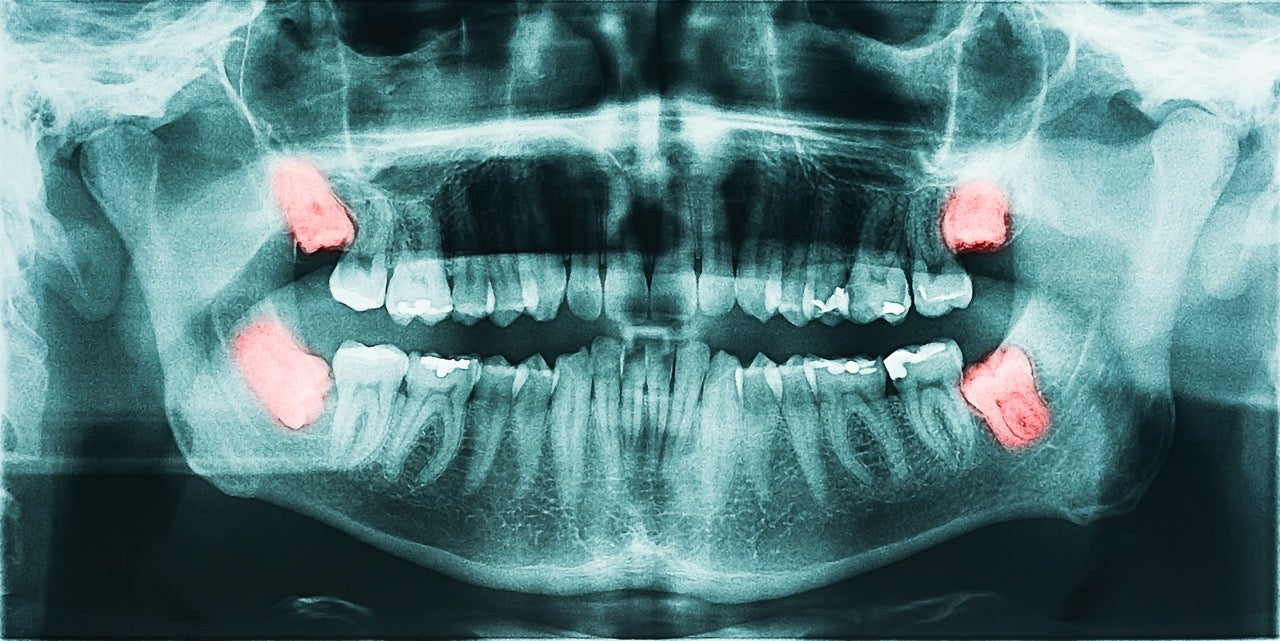Information Library
Start Reading

Wisdom teeth removal is a common rite of passage for late teens and young adults. Statistics show that 5 million people have wisdom teeth removed each year. But what are wisdom teeth, why do they cause pain, and why must they be removed? The wisdom teeth specialists at Penn Dental Medicine have compiled this informative guide to answer these questions and more.
 What Are Wisdom Teeth?
What Are Wisdom Teeth?Wisdom teeth, also known as third molars, are the last set of teeth to emerge in the back corners of your mouth. Most people develop four wisdom teeth, although having fewer or none is not uncommon.
Wisdom teeth usually appear between the ages of 17 and 25.
Wisdom teeth are often removed because they can cause various issues, including:
 Diagnosing wisdom teeth typically involves a combination of dental examinations and imaging techniques to evaluate their position and potential impact on oral health.
Diagnosing wisdom teeth typically involves a combination of dental examinations and imaging techniques to evaluate their position and potential impact on oral health.
Here’s how dentists usually diagnose whether your wisdom teeth may need attention:
Before the extraction, you’ll visit an oral surgeon or dentist to discuss your situation. They will provide a treatment plan and discuss anesthesia options, ranging from local anesthesia to general anesthesia, depending on the complexity of the extraction.
The Surgery
Wisdom teeth removal is typically an outpatient procedure, taking about 45 minutes to an hour. The general steps include:
Immediate Post-Surgery Care:
Once the procedure is over, you’ll spend time in a recovery room under observation. During your initial recovery, you can expect instructions to include:
Managing Pain and Swelling:
Your diet and fluid intake are critical for recovery afterward. Your dentist will tell you to stick to soft foods such as yogurt, applesauce, and soups for a few days. You’ll also be instructed to drink plenty of fluids, but avoid using a straw, as suction may dislodge blood clots and delay healing.
Oral hygiene is always important, and especially after surgery. Brush your teeth carefully and rinse your mouth with warm salt water to maintain oral hygiene without disturbing the incisions.
 Full recovery can take a couple of weeks. During this period, attend any scheduled postoperative appointments to ensure proper healing. You’ll also be asked to refrain from smoking or drinking alcohol as these can impede healing. And, you’ll be instructed to avoid sports or physical activity for at least a week.
Full recovery can take a couple of weeks. During this period, attend any scheduled postoperative appointments to ensure proper healing. You’ll also be asked to refrain from smoking or drinking alcohol as these can impede healing. And, you’ll be instructed to avoid sports or physical activity for at least a week.
If you or a child is experiencing pain or swelling in the back of your mouth, find out if it’s caused by wisdom teeth. Talk to a wisdom teeth specialist at PDM. From initial consultation to removal to recovery, our state-of-the-art facility and dedication to patient care make us a trusted choice for dental care. At Penn Dental Medicine, our team is committed to providing high-quality care tailored to your individual needs at a lower cost than what you’d pay elsewhere. It’s the smart choice to make for wisdom teeth care. You can make an appointment by calling 215-898-8965 or completing this form.